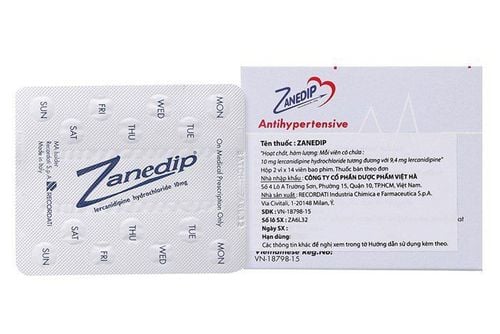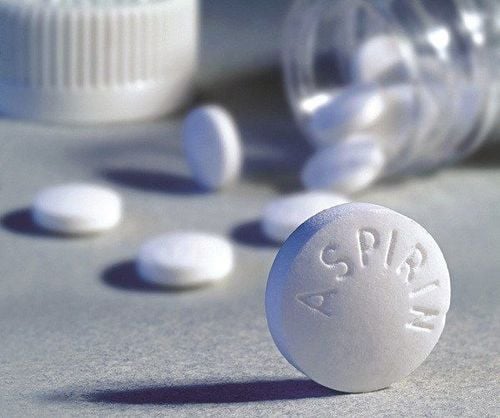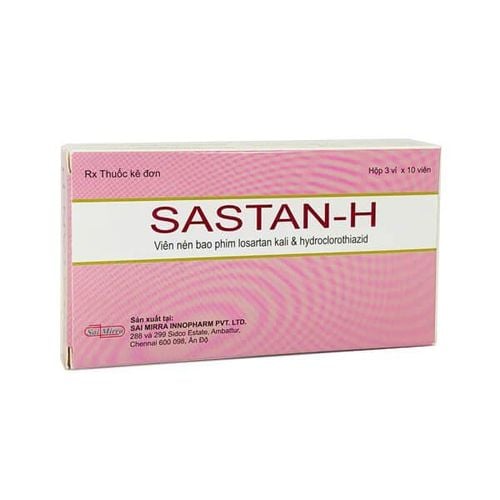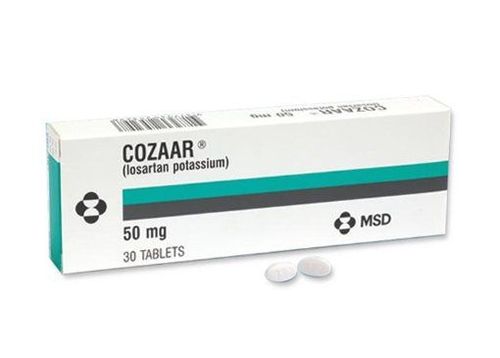This is an automatically translated article.
Nerazzu plus is a prescription drug used in the treatment of a number of cardiovascular conditions. So what is the drug Nerazzu plus, how to use it? Please read the following article for more information about this drug.
1. What is Nerazzu plus?
Nerazzu plus is a cardiovascular drug made in the form of film-coated tablets with the main ingredients being:
Losartan potassium 100mg; Hydrochlorothiazide 25mg. Losartan is an angiotensin II (type AT1) receptor antagonist. Losartan and its major metabolite block the vasoconstricting and aldosterone-secreting effects of angiotensin II by selectively blocking angiotensin II from binding to the AT1 receptor in vascular smooth muscle, the adrenal gland and the adrenal gland. .
Neither losartan nor its major active metabolite exhibits local agonist activity at the AT1 receptor, which has approximately 1000 times greater affinity for the AT1 receptor than the AT2 receptor. Hydrochlorothiazide is a thiazide diuretic, which increases the excretion of sodium chloride and water by inhibiting the reabsorption of sodium and chloride ions in the distal tubule. The excretion of other electrolytes is also increased with the use of this drug, especially potassium and magnesium, while calcium is decreased. Hydrochlorothiazide also has the effect of reducing carbonic anhydrase activity, thus increasing bicarbonate excretion, but this effect is usually small compared to the effect of Cl- excretion and does not significantly change the urine pH level. Thiazide diuretics have a moderate diuretic effect, since about 90% of sodium ions have been reabsorbed before reaching the distal tubule, which is the main site of action of the drug.
2. Indications and contraindications for drug use
Nerazzu plus is indicated in the following cases:
Essential hypertension in patients not controlled by losartan or hydrochlorothiazide alone; Reduced risk of stroke in patients with hypertension and left ventricular hypertrophy. Nerazzu plus is contraindicated in the following cases:
People with hypersensitivity to Losartan, Hydrochlorothiazide or to any of its ingredients; People with gout, hyperuricemia, Addison's disease, anuria, hypercalcemia, severe liver and kidney failure; People with a history of hypersensitivity to other derivatives of the Sulfonamide group; Pregnant women; People with persistent hyponatremia; Do not use the combination of Aliskiren with Nerazzu plus in patients with diabetes or renal failure (GFR < 60 ml/min/1.73m2); Patients with gallstones or biliary obstruction, anuria.
3. Dosage and how to use Nerazzu plus
Use Nerazzu plus only when monotherapy does not control blood pressure. Dosage of Nerazzu plus should be according to the prescription of a specialist.
When patients do not respond adequately to Losartan potassium 50 mg/hydrochlorothiazide 12.5 mg orally once a day after 3 weeks, the dose may be increased to a maximum dose of 100 mg/hydrochlorothiazide 25 mg.
How to use Nerazzu plus:
Nerazzu plus can be used together with other antihypertensive drugs; Nerazzu plus should be taken with a full glass of water, with or without food. Nerazzu plus overdose symptoms related to Losartan. The most common manifestations are hypotension and tachycardia; Symptoms of bradycardia may also occur due to stimulation of the parasympathetic (vagal) nerves. When hypotension occurs, supportive treatment is required. Losartan and its active metabolites cannot be removed from the blood by hemodialysis.
Symptoms of overdose with Nerazzu plus related to Hydrochlorothiazide manifest mainly as water and electrolyte disturbances due to excessive diuresis. If you are taking Digitalis, hypokalemia may increase arrhythmias. Overdose treatment by:
Gastric lavage when using the drug, can use activated charcoal; Anti-alkalosis: Use ammonium chloride unless the patient has liver disease; Quickly replenish lost water and electrolytes; Peritoneal dialysis may be performed to correct water and electrolyte balance. In case of hypotension that does not respond to the above interventions, use norepinephrine 4 mg/liter by slow intravenous infusion or use dopamine at an initial dose of 5 mcg/kg/min.
4. Side effects of the drug Nerazzu plus
In clinical trials with the use of losartan potassium and hydrochlorothiazide, no undesirable effects were observed for this type of combination. Adverse effects were limited to reactions seen with losartan and/or hydrochlorothiazide alone.
In general, Nerazzu plus was well tolerated, most of the side effects were mild and transient, and did not require discontinuation. Rare side effects of this two-drug combination include hepatitis, hyperkalemia, and elevated ALT.
4.1. Side effects associated with Losartan Common:
Gastrointestinal include: Nausea, abdominal pain, dyspepsia, diarrhea; Body as a whole includes: Fatigue, weakness, hypotension, chest pain; Muscles and connective tissue include: Cramps, leg pain, muscle pain, back pain; Nerves include: Headache, dizziness; Psychiatric include: Insomnia, dizziness, fatigue; Urinary tract includes: Renal impairment, hypouricemia (when used in high doses), renal failure, urinary tract infection; Respiratory includes: Cough, nasal congestion, nasal congestion, upper respiratory tract infection, sinusitis, sinus disease; Biochemistry includes: Hyperkalemia, slight decrease in hemoglobin and hemoglobin levels, hypoglycemia. Uncommon:
Hematology includes: Anemia, hemolysis, ecchymosis, purpura; Cardiovascular including: hypotension, orthostatic hypotension, angina, sternum pain, second-degree atrioventricular block, palpitations, cerebrovascular events, myocardial infarction, arrhythmia; Vestibular include: Dizziness, tinnitus; Eyes include: Blurred vision, decreased vision, conjunctivitis, burning or stinging sensation; Digestive include: Toothache, dry mouth, flatulence, gastritis, vomiting, constipation; The whole body includes: Angioedema; Metabolism and nutrition include: Anorexia, gout; Musculoskeletal and connective tissue include: Arm pain, knee pain, joint swelling, joint pain, arthritis, musculoskeletal pain, shoulder pain, muscle stiffness, hip pain, muscle pain, muscle weakness; Neurological include: Tense, paresthesia, tremor, peripheral neuropathy, migraine, syncope; Psychiatric includes: Anxiety, anxiety disorder, panic disorder, ataxia, confusion, depression, headache, migraine, sleep disturbance, nightmares, fever, dizziness, somnolence , memory decline; Urology includes: Frequent urination, nocturia, urinary tract infections; Genitourinary includes: Decreased libido, erectile dysfunction, impotence; Respiratory includes: pharyngeal discomfort, epistaxis, rhinitis, pharyngitis, laryngitis, dyspnea, bronchitis, airway obstruction. Skin includes: Alopecia, dry skin, erythema, flushing, dermatitis, photosensitivity, urticaria, rash, sweating; Vascular includes: Vasculitis; Biochemicals include: Increased serum urea and creatinine concentrations. Rare side effects include:
Immunologic including: Anaphylaxis, angioedema including laryngeal and glottis edema causing airway obstruction and/or swelling of the face, lips, throat and/or tongue . Very rare side effects include:
Increased liver enzymes and bilirubin. Side effects of unknown frequency include:
Thrombocytopenia; Flu-like symptoms, discomfort; Abnormal liver function; Muscle wasting; Taste disorder; Orthostatic hypotension is dose dependent; Hyponatremia. 4.2. Side effects related to hydrochlorothiazide: Common:
Whole body including: Fatigue, headache, dizziness, dizziness; Circulation includes: Orthostatic hypotension; Metabolism includes: hypokalemia, hyperglycemia, hyperuricemia, hyperlipidemia (at high doses). Uncommon side effects include:
Circulatory include: Postural hypotension, arrhythmia; Hematology includes: granulocytopenia, hemolytic anemia, aplastic anemia, leukopenia, purpura, thrombocytopenia; Metabolism and nutrition include: hypomagnesaemia, hyponatremia, hypophosphataemia, hypercalcemia, hypochloremic alkalosis; Eyes include: Persistent blurred vision, yellow vision; Vascular includes: Necrotizing vasculitis (eg, vasculitis, subcutaneous vasculitis); Respiratory includes: Alveolar wall inflammation and pulmonary edema; Digestive include: Salivary gland inflammation, upset stomach, intestinal spasms, nausea, vomiting, diarrhea, constipation; Hepatobiliary includes: Jaundice, pancreatitis; Skin includes: photosensitivity, rash, urticaria, toxic epidermal necrolysis, Stevens-Johnson syndrome; Skeletal muscle and connective tissue include: Cramps; Urology includes: Glucoseuria, interstitial nephritis, kidney disease, renal failure; Body as a whole including: Fever, dizziness. Rare side effects include:
Anaphylactic reactions. Side effects of unknown frequency include:
Lupus erythematosus; Hyperuricemia, which may lead to the onset of a potential gout attack; Orthostatic hypotension may occur with concomitant use of alcohol, anesthetics and sedatives.
5. Drug interaction Nerazzu plus with other drugs
Drug interactions related to Losartan:
Rifampicin and fluconazole have been reported to reduce concentrations of the active metabolite of Losartan; Co-administration of losartan with potassium-sparing diuretics, potassium supplements or salt substitutes containing potassium may cause an increase in serum potassium. Therefore, general use is not recommended; Closely monitor serum lithium levels if the patient is taking Lithium salts with Nerazzu plus; When Losartan is used concurrently with NSAIDs, the antihypertensive effect may be reduced and may lead to an increased risk of renal failure. Use caution when using this drug combination especially in the elderly; Research has shown that the combined use of ACE inhibitors with angiotensin II receptor antagonists or aliskiren increases the frequency of adverse events such as hypotension, hyperkalemia and impaired renal function; Other drugs that may enhance the antihypertensive effect of losartan such as tricyclic antidepressants, antipsychotics, baclofen, amifostine; Co-administration of losartan with phenobarbital resulted in an approximately 20% decrease in the AUC of losartan and its active metabolite; Rifampicin, carbamazepine, nafcilin, aminoglutethimide, nevirapine, phenytoin, reduce plasma concentrations of losartan and its metabolites when administered concomitantly; Losartan will increase the effect of Amifostin, antihypertensive drugs, hypoglycemic drugs, carvedilol, rituximab when used together. When using Nerazzu plus with the following drugs may interact with Hydrochlorothiazide:
Alcohol, barbiturates or narcotic hypnotics increase the potential for orthostatic hypotension; Antidiabetic drugs (including oral and injectable insulin): Concomitant use with thiazides may impair glucose tolerance. Therefore, it is necessary to adjust the dose carefully due to the risk of lactic acidosis due to impaired renal function caused by hydrochlorothiazide; Other antihypertensive agents when used together will have a synergistic effect or increase the antihypertensive potential; Cholestyramine resin or colestipol when used together will reduce the absorption of these drugs from the gastrointestinal tract; Hypertensive amines (e.g. adrenaline) when used with hydrochlorothiazide may decrease response to hypertensive amines, but not sufficiently to prevent effect; Concomitant use of hydrochlorothiazide with muscle relaxants may increase the response to muscle relaxants; Lithium should not be used with hydrochlorothiazide, because of decreased renal clearance of lithium and increased toxicity of this substance; Gout medications (eg, probenecid, sulfinpyrazol, allopurinol): Dosage adjustment of these drugs may be necessary because hydrochlorothiazide increases serum uric acid levels. Co-administration of hydrochlorothazid with allopurinol may increase the frequency of hypersensitivity reactions to allopurinol; Parasympathomimetics (eg atropine, biperiden): Increases the bioavailability of hydrochlorothiazide when used together, due to a decrease in gastrointestinal motility and a decrease in the rate of gastric emptying; Cytotoxic substances (eg, cyclophosphamide, methotrexate): Hydrochlorothazid may reduce renal excretion of cytotoxic substances and increase the toxicity of this drug on bone marrow; Salicylates: In the case of high doses of salicylates, hydrochlorothiazide can increase the toxicity of salicylates on the central nervous system; Methyldopa when used together with hydrochlorothiazide can cause hemolytic anemia; Cyclosporin: Concomitant use of hydrochlorothazid with cyclosporin increases the risk of hyperuricemia and complications of gout; Digitalis glycosides: Hydrochlorothiazide causes hypokalemia or hypomagnesaemia, possibly triggering digitalis arrhythmias; Drugs Affecting Serum Potassium Levels: When Nerazzu plus is used with drugs that affect serum potassium levels (such as digitalis glycosides and antiarrhythmics), with drugs with a risk of torsades de pointes such as antiarrhythmics. ), hypokalemia is a risk factor for torsades de pointes, requiring periodic monitoring of serum potassium levels and electrocardiograms; Calcium salts: Hydrochlorothiazide may cause an increase in serum calcium concentration due to decreased elimination. If calcium supplements are indicated, the physician should monitor serum calcium levels and adjust the dose accordingly; Effects on laboratory results: Due to its effects on calcium metabolism, Hydrochlorothiazide may interfere with parathyroid tests; Carbamazepine: Risk of symptomatic hyponatremia when used with Hydrochlorothiazide; Contrast containing iodine, Amphotericin B, Corticosteroids, Salbutamol, ACTH, Barbenoxolon or Reboxetin when used with Hydrochlorothiazide will increase electrolyte imbalance, especially hypokalemia; Non-Steroidal Anti-Inflammatory Drugs: May decrease the effect of Hydrochlorothiazide. Therefore, if it is necessary to use it together, the doctor will have to monitor it to see if the desired diuretic effect is achieved; Hydrochlorothiazide reduces the effect of anticoagulants; Hydrochlorothiazide increases the effect of anesthetics, glycosides, vitamin D; Tetracycline toxicity is increased when used with Hydrochlorothiazide; Hydrochlorothiazide should be avoided with star herbs: Licorice has the effect of causing water and sodium retention and increasing potassium loss. Dang quai has oestrogenic activity that causes water retention and may also cause photosensitivity. Ephedra, ginseng, yohimbe because they can make the condition of high blood pressure worse. Above is all information about the drug Nerazzu plus. To ensure safety for your health and maximize the effectiveness of your treatment, you need to take Nerazzu plus exactly as directed by your doctor.
Please dial HOTLINE for more information or register for an appointment HERE. Download MyVinmec app to make appointments faster and to manage your bookings easily.













